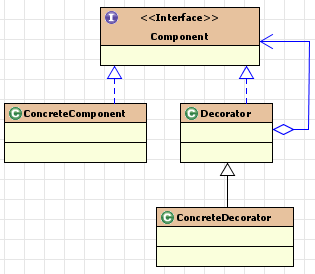装饰模式是对对象功能增强时,平时使用继承的一种替代方案
一.UML示意图:

二.组成部分:
1.
抽象构件:原始的功能接口
2.
具体构件:具体的原始功能类
3.
装饰角色:持有具体构件类的对象,以便执行原有功能
4.
具体装饰:具体扩展的功能在这里
三.
例子代码:使用装饰模式来演示一个对”行走”功能扩展的例子(听音乐+行走和唱歌+行走)
1. 抽象构件
package
com.eekq.decorator;
publicinterface
Component {
/**
原始接口
*/
publicvoid
go();
}
2. 具体构件
package
com.eekq.decorator;
publicclass
ConcreteComponent
implements
Component {
publicvoid
go() {
System.
out
.println(
"行走"
);
}
}
3.装饰角色来了
package
com.eekq.decorator;
publicclass
Decorator
implements
Component {
/**
持有私有的原始构件
*/
private
Component
component
;
/**
构造子,委派给原始构件
*/
protected
Decorator(Component component) {
this
.
component
= component;
}
/**调用原始构件功能,通常就可直接把扩展功能加在此方法中*/
publicvoid
go() {
this
.
component
.go();
}
}
4.具体装饰(这里演示了两种扩展的情况,走路+听音乐和唱歌s)
(1).
package
com.eekq.decorator;
publicclass
ConcreteDecoratorListen
extends
Decorator {
/**
构造子,相关初始化
*/
public
ConcreteDecoratorListen(Component component) {
super
(component);
// code is here
}
/**
商业逻辑,对原始构件功能的扩展
*/
publicvoid
go() {
listen(
"听音乐"
);
//执行扩展功能
super
.go();
}
privatevoid
listen(Object obj){
System.
out
.println(obj);
}
}
(2).
package
com.eekq.decorator;
publicclass
ConcreteDecoratorSing
extends
Decorator {
/**
构造子,相关初始化
*/
public
ConcreteDecoratorSing(Component component) {
super
(component);
// code is here
}
/**
商业逻辑,对原始构件功能的扩展
*/
publicvoid
go() {
super
.go();
System.
out
.println(sing());;
// 执行扩展功能
}
private
String sing() {
return
"唱歌"
;
}
}
5.客户端调用
package
com.eekq.decorator;
publicclass
Main {
publicstaticvoid
main(String[] args) {
/**
原始构件
*/
Component component =
new
ConcreteComponent();
/**边听音乐,边走路*/
ConcreteDecoratorListen cdl =
new
ConcreteDecoratorListen(component);
cdl.go();
System.
out
.println();
/**边走路,边唱歌*/
ConcreteDecoratorSing cds =
new
ConcreteDecoratorSing(component);
cds.go();
}
}
四.
总结
优点:装饰模式和继承都是对功能的扩展,而装饰模式使用的是组合,可以不用继承而达到这一效果.使用过多的继承会增加系统的复杂性和偶合性
缺点:装饰模式要产生一些辅助性的对象,但这些对象看上去都比较像,不是很容易检查(好的命名应该是提高检查的一个办法)






















 1537
1537

 被折叠的 条评论
为什么被折叠?
被折叠的 条评论
为什么被折叠?








